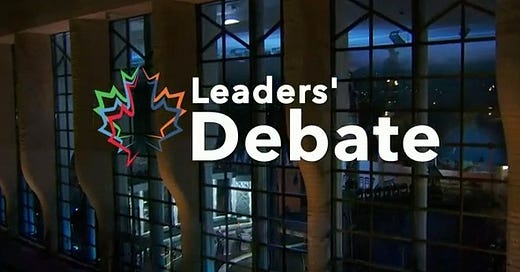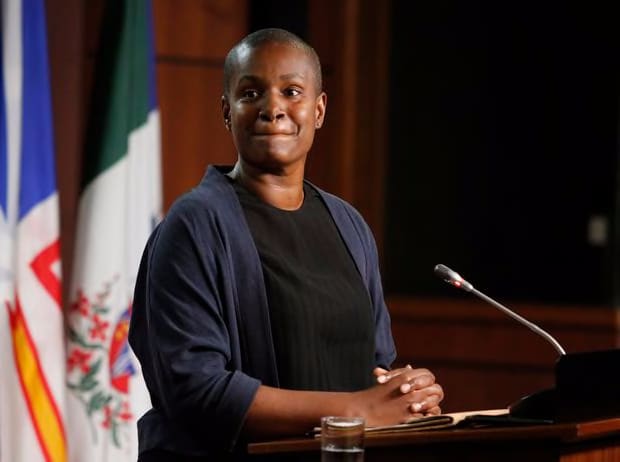Yesterday, I published my thoughts on what Canada’s federal party leaders needed to accomplish in the English language debate in order to achieve their goals.
How did they do?
The format made it difficult wfor the leaders to stick to their talking points. With a conventional opening/closing statement format, there’s at least 90 seconds at the front and back of a debate to crystallize your message in your own words without interruption. This debate dispensed with that.
This format also did not allow leaders to respond to accusations, allegations and outright lies hurled against them by competitors. Instead, they were forced to move on to a new topic. Halfway through the debate, though, leaders clued in – and used the opportunity to slam opponents with drive by smears that could not be answered.
Justin Trudeau
Mission: Make himself appear to be the safest choice for Canadians.
FAIL. As the incumbent PM, Trudeau knew he would be in everyone’s crosshairs. He knew the charges would be about his performance over six years in office. Despite knowing everything that would be said about him and despite this being his third campaign as leader having made multiple appearances on the leaders debate stage, he still failed to perform well.
Trudeau was frequently muzzled by the format and a very strident moderator who wouldn’t allow a riposte — leaving him visibly frustrated. So, at his next opportunity to speak, he’d try to cram in his response as well as all his talking point on the new subject at hand. It made for a mile-a-minute talking pace that left him breathless half way through his reply. The result: he looked aggravated, uncomfortable, unsure and desperate. Desperate is never a good look.
He did not look like the best choice to lead a country facing serious challenges.
Erin O’Toole
Mission: Don’t look scary. Sound reasonable.
PASS. O’Toole kept his cool. He largely kept to his key talking points, though he did try to slide a few zingers in on Trudeau when he probably shouldn’t have. It made him look like a typical politician – something nobody admires.
Despite the carefully directed format, he managed to address many of the “third rail” issues that have electrocuted his predecessors: “I’m pro-choice… Will defend the rights of all Canadians, including women and the LGTBQ community. Climate change is real and past Conservative plans didn’t measure up; we need to win back trust and so released a plan in April before the election.”
On the matter of reconciliation, he even sounded somewhat prime ministerial, admitting “I know Mr. Trudeau cares a great deal about reconciliation. We all do…” We need to work together and hold ourselves to account.
It was O’Toole’s first appearance on the Leaders Debate stage and, overall, he did what he needed to do. He didn’t force himself into the conversation and thus didn’t look obnoxious or overbearing.
Although he didn’t speak masterfully or with great style, he used his time to repeat his key messages, including a call to action to read his “Canada’s Recovery Plan.” He was engaged and active, but never lost his temper.
He did not look the least bit scary.
Jagmeet Singh
Mission: Make the NDP sound like the smart choice for progressive voters.
INCOMPLETE. Singh has been on this stage before and, with no one expecting him to win the election, he looked relaxed and comfortable there.
He’s broadly popular and has the luxury of making extravagant promises he’ll never be called upon to fulfil. He spoke passionately and took every opportunity to paint Trudeau as the guy who promised the world and delivered none of it. Ironic, I know.
From his first opportunity to speak, Singh drew the line between himself and Justin Trudeau: Singh would be the champion progressives wanted while Trudeau talks a great game, but in the end delivered nothing but boons for the rich. Singh’s NDP would tax them. A lot. It was a theme he returned to at every chance.
Singh came across as a better choice for progressives looking for a white knight, but he did not close the deal — leaving progressives with a quandary: vote for the better guy who won’t win, or the disappointing guy who might?
He should have made the case that he would be the power broker in parliament, delivering on progressive ideas regardless who forms government. A missed opportunity that Yves Blanchet nailed.
Annamie Paul
Mission: Convince Green Party of Canada members that she still deserves to lead them.
INCOMPLETE. Paul spent a great deal of her time speaking to her own members – and her party executive – and not to voters. Which is exactly what she should have done. She can’t win and is unlikely to win a seat for herself.
When asked directly how she could unify Canada since she hasn’t even been able to unite her own party, she didn’t dodge. She wished her party was more united.
Then, she turned the knife on her own executive, explaining that because of who she is (a Black, Jewish woman) she “was forced to crawl over broken glass.” Later, she identified with an indigenous voter, saying she too is a member of a diaspora who doesn’t know where all her ancestors are buried. Many observers believe the Green Party has a problem with antisemitism. True or not, Paul served that up as a convenient and contemptible reason why the party executive hates her – something she has been loathe to charge in public.
In many of her answers, Paul seemed to address her party’s internal turncoats as much as she was attacking Trudeau: “Canada’s word needs to mean something,” but it doesn’t. A charge she could equally have been making against mandarins in the Green Party. She talked often about the toxicity of Ottawa culture, perhaps implying a parallel with her party’s own culture.
Paul also took two opportunities to shout out to her riding of Toronto-Centre, hoping to remind the audience there they can vote for her directly. Smart move.
She took some clever shots at Trudeau, and waxed eloquently (and naively) about leading all parties together to a greener future. And, she showed some mettle —pushing back sharply on Jagmeet Singh when he suggested his NDP was the only party that cares and she stood up to Blanchet when he took issue with her charge of racism. She’s got spine.
If she was hoping to excite the party base as an eloquent, powerful spokeswoman for the Green Party, I’m uncertain whether she succeeded. Though, she was far more compelling for non-Green Party viewers than Elizabeth May ever was. Nor, is it clear if she will have rallied her own troops around the Annamie Paul flag when the election is over and her leadership comes under formal review.
All that said, Annamie Paul has no real professional political staff to support her and few trustworthy party stalwarts to lean on. Her own party executive are trying to destroy her. For a political rookie to show up on a live nationally-televised debate stage with four seasoned politicians who’ve all (except O’Toole) done this before and pull off even a mediocre performance – well, that’s very impressive indeed.
She’ll have a bright future and will do great things with the Green Party — if the party ever decides to pull its collective head out of its collective colon.
Yves Blanchet
Mission: Make Quebeckers think he’s the only hope for the province to get what it wants.
PASS. Unlike Jagmeet Singh, Blanchet hit all his marks. He was an ardent advocate for Quebec as a special interest group. And, he made a clear, compelling case for why Quebeckers should vote for him – even though he will never form government in Ottawa: “If Quebeckers want it, I will lead the watchdogs in a minority parliament” to ensure Quebec gets (more than) its fair share. Singh should take notes.
Blanchet even made sense to non-separatists, asking “What can a Canadian do better than a Quebecker can do?” Why should there be a national standard for long term care homes? The problem in Quebec, Blanchet says, was not a lack of knowledge or ability. It was a lack of resources. In every instance, the solution to major problems, according to the Bloc leader, is more money from Ottawa for Quebec. How do you argue with that?
Blanchet looked like the only guy who will put the interests of Quebeckers first, last and always.









